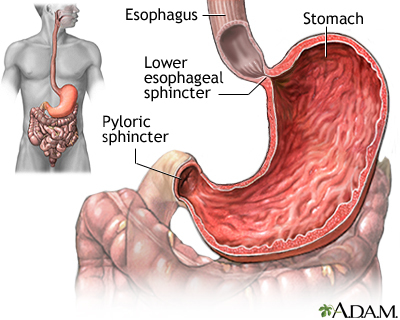Breath test could detect stomach cancer
One of the fundamental truths about cancer is the earlier it’s detected, the better. If doctors locate a tumor just after it forms, there’s an increased chance of successful...
Update your location to show providers, locations, and services closest to you.
Stomach cancer is cancer that starts in the stomach.
Cancer - stomach; Gastric cancer; Gastric carcinoma; Adenocarcinoma of the stomach
Several types of cancer can occur in the stomach. The most common type is called adenocarcinoma. It starts from one of the cell types found in the lining of the stomach.
Adenocarcinoma is a common cancer of the digestive tract. It is less common in the stomach in the United States, compared to Asia. It is diagnosed much more often in people in eastern Asia, parts of South America, and eastern and central Europe. It occurs most often in men over age 40.
The number of people in the United States who develop this cancer has decreased over the years. Experts think this decrease may be in part because people are eating less salted, cured, and smoked foods.
You are more likely to be diagnosed with gastric cancer if you:
Symptoms of stomach cancer may include any of the following:
Diagnosis is often delayed because symptoms may not occur in the early stages of the disease. And many of the symptoms do not specifically point to the stomach. So, people often self-treat symptoms that gastric cancer has in common with other, less serious, disorders (bloating, gas, heartburn, and fullness).
Tests that can help diagnose gastric cancer include:
Surgery to remove the stomach (gastrectomy) before the cancer has spread is the standard treatment that can cure adenocarcinoma of the stomach. Radiation therapy and chemotherapy may help. Chemotherapy and radiation therapy after surgery may improve the chance of a cure.
For people who cannot have surgery, chemotherapy or radiation may improve symptoms and may prolong survival, but will not cure the cancer. For some people, a surgical bypass procedure may relieve symptoms.
You can ease the stress of illness by joining a cancer support group. Sharing with others who have common experiences and problems can help you not feel alone.
Outlook varies based on how much the cancer has spread by the time of diagnosis. Tumors in the lower stomach are cured more often than those in the higher stomach. The chance of a cure also depends on how far the tumor has invaded the stomach wall and whether lymph nodes are involved.
When the tumor has spread outside the stomach, a cure is less likely. When a cure is not possible, the goal of treatment is to improve symptoms and prolong life.
Contact your health care provider if symptoms of gastric cancer develop.
Screening programs are successful in detecting disease in the early stages in parts of the world where the risk for stomach cancer is much higher than in the United States. The value of screening in the United States and other countries with much lower rates of stomach cancer is not clear.
The following may help reduce your risk for stomach cancer:



Ku GY, Ilson DH. Cancer of the stomach. In: Niederhuber JE, Armitage JO, Kastan MB, Doroshow JH, Tepper JE, eds. Abeloff's Clinical Oncology. 6th ed. Philadelphia, PA: Elsevier; 2020:chap 72.
National Cancer Institute website. Gastric cancer treatment (PDQ) - health professional version. www.cancer.gov/types/stomach/hp/stomach-treatment-pdq. Updated January 30, 2023. Accessed March 06, 2023.
Quante M, Bornschein J. Adenocarcinoma of the stomach and other gastric tumors. In: Feldman M, Friedman LS, Brandt LJ, eds. Sleisenger and Fordtran's Gastrointestinal and Liver Disease. 11th ed. Philadelphia, PA: Elsevier; 2021:chap 54.
Our community and patient programs provide great value to patients, families and loved ones. People can find support, educational materials, expert consultants and more. In most instances, these programs are offered free of charge.
Improves health and quality of life for long-term cancer survivors.
An educational and networking event that brings together cancer patients, survivors, caregivers and health care professionals.
Interdisciplinary facility that helps support the diverse needs of individuals and families.
Pain management treatment plans for cancer patients.
Helps individuals access high-quality cancer screening, prevention and treatment services.
Can assist you through the treatment process in a number of practical and supportive ways.
One of the fundamental truths about cancer is the earlier it’s detected, the better. If doctors locate a tumor just after it forms, there’s an increased chance of successful...
It’s a beverage that’s been brewed and consumed worldwide for thousands of years. What is this libation, you ask? Beer. There are hundreds of reasons people drink beer, but new research shows that...
It’s a beverage that’s been brewed and consumed worldwide for thousands of years. What is this libation, you ask? Beer. There are hundreds of reasons people drink beer, but new research shows that...